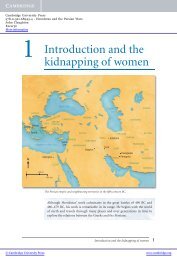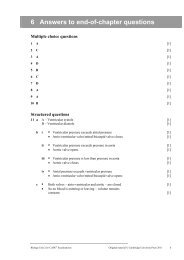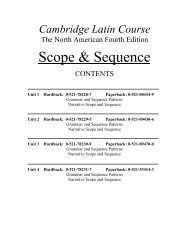Brad Philpot - Cambridge University Press
Brad Philpot - Cambridge University Press
Brad Philpot - Cambridge University Press
You also want an ePaper? Increase the reach of your titles
YUMPU automatically turns print PDFs into web optimized ePapers that Google loves.
making anarchist claims. He spoke out about the inequalities between the Algerians<br />
and French in Algeria, which was a French colony until 1962. In 1940, after he saw<br />
some Nazis murder a French communist politician, Gabriel Péri, Camus joined the<br />
underground Resistance movement. Like Solzhenitsyn, Camus was also a winner of the<br />
Nobel Prize in Literature (1957).<br />
Although Camus rejected the existentialist label, The Stranger is often seen as<br />
a work of existentialism. In it, the main character, Meursault, leads an ordinary life<br />
that begins to fall apart after his mother dies; he meets an old girlfriend and his<br />
neighbour beats an Algerian lover. Meursault becomes involved in his neighbour’s<br />
affairs and finds himself being tailed by angry Arabs. In an act of what seems like<br />
random violence he shoots and kills an Arab. The following extract begins after he is<br />
imprisoned for murder.<br />
The next day a lawyer came to see me at the prison. He was short and stout,<br />
quite young, with his hair carefully greased back. In spite of the heat (I was in<br />
my shirt-sleeves), he was wearing a dark suit, a wing collar and a peculiar tie<br />
with broad black and white stripes. He put the briefcase which he had under his<br />
arm down on my bed, introduced himself, and told me that he’d studied my file.<br />
My case was tricky, but he was confident of success provided I had faith in him.<br />
I thanked him and he said, ‘Let’s get straight on with it.’<br />
He sat down on the bed and explained that some investigations had been<br />
made into my private life. It had been discovered that my mother had died recently<br />
in a home. Enquiries had then been made in Marengo, and the magistrates had<br />
learned that I’d ‘displayed a lack of emotion on the day of mother’s funeral. ‘You<br />
will understand,’ my lawyer said, that I feel another embarrassed at having to ask<br />
you this. But it matters a great deal. And the prosecution will have a strong case<br />
if I can’t find anything to reply.’ He wanted me to help him. He asked me if I’d felt<br />
any that day. This question really surprised me and I thought how embarrassed I’d<br />
have been if I’d had to ask it.<br />
I replied though that I’d rather got out of the habit of analyzing myself and<br />
that I found it difficult to answer his question. I probably loved mother quite a lot,<br />
but that didn’t mean anything. To a certain extent all normal people sometimes<br />
wished their loved ones dead. Here the lawyer interrupted me, looking very<br />
flustered. He made me promise not to say that at the hearing, or in front of the<br />
examining magistrate. But I explained to him that by nature my physical needs<br />
often distorted my feelings. On the day of mother’s funeral I was very tired and<br />
sleepy. So I wasn’t fully aware of what was going on. The only thing I could say for<br />
certain was that I’d rather mother hadn’t died. But my lawyer didn’t seem pleased.<br />
He said, ‘That’s not enough.’<br />
He thought for a moment. Then he asked me if he could say that I’d controlled<br />
my natural feelings that day. I said, ‘No, because it’s not true.’ He looked at me in<br />
a peculiar way, as if he found me slightly disgusting. He told me almost spitefully<br />
that whatever happened the warden and staff of the home would be called as<br />
witnesses and that this ‘could make things any unpleasant for me’. I pointed out<br />
to him that none of this had anything to do with my case, but he merely replied<br />
that obviously never had anything to do with the law.<br />
Chapter 6 The context of composition<br />
Figure 6.6 How does this image from<br />
Luchino Visconti’s film of The Stranger<br />
(Lo Straniero) depict the narrator,<br />
Meursault, from Text 6.5?<br />
Sample<br />
© <strong>Cambridge</strong> <strong>University</strong> <strong>Press</strong> 2011<br />
147








